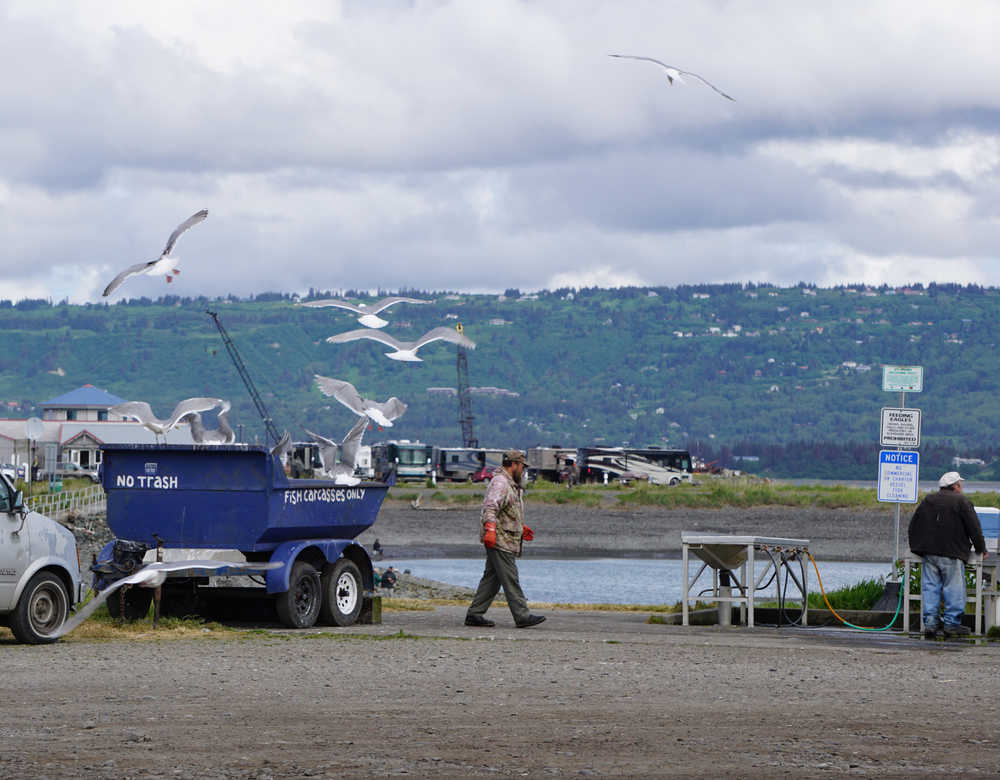HOMER — On a good day when fishermen pull sea-bright king salmon out of the Nick Dudiak Fishing Lagoon faster than the tide runs, the cleaning tables fill up with people cleaning their catch. You’d better watch your back — and the sky — lest a ravenous gull scoops down and snags a fish.
“While trying to fillet their catches, anglers were under siege by a squadron of sky rats with the manners of turkey buzzards jazzed after power wolfing a commercial tanker of Red Bull,” is how Homer News fishing columnist Nick Varney once described the assault.
Open to the air, the fishing tables and a carcass trailer attract dozens of glaucous or herring gulls, The Homer News reported. Hanging out on the roof of Pier One Theatre or sitting in the parking lot, the gulls wait like street punks eyeing a tourist’s fat wallet.
That will end this year, and Homer’s local avian scavengers will have to find better pickings. Thanks to a $60,000 grant from the Alaska Department of Fish and Game, by fall the city of Homer plans to build a roof over the cleaning tables and carcass trailer that’s similar to other fishing cleaning sheds at the Homer Harbor. Nets strung on the side also will keep birds from swooping in. Homer Harbormaster Bryan Hawkins called it “a reverse bird cage,” where the people are inside the cage and the birds outside.
A protected table also will keep gulls from preying on hatchery-raised salmon fry held in pens in the lagoon before being released to the sea. With fewer gulls around, the problem of bird doo contaminating the fishing hole will be reduced.
“We’re pretty excited,” Hawkins said. “We’ve been talking with Fish and Game for years about making an improvement there.”
At its May 23 meeting, the Homer City Council passed a resolution approving a cooperative agreement with Fish and Game and the city. Fish and Game will pay for design and construction. In return, the Port and Harbor Department will maintain and clean the tables.
For several years, fishermen have been clamoring for the same kind of protection enjoyed at the fishing hole cleaning tables near the harbor. Fish and Game officials knew of the situation, but didn’t have funds available.
“It’s been on our radar for several years for sure,” said Carol Kerkvliet, assistant sport fish area management biologist in the Homer Fish and Game office.
This year, as the state’s 2016 fiscal year came to an end, Fish and Game had some money available for the fishing table shelter “to take care of something we considered a high priority,” said Tom Vania, regional supervisor in the Anchorage office for Fish and Game Region 2, Southcentral Alaska, Kodiak Island and Bristol Bay.
“I was completely surprised by it. It came out of the blue. Finally, we got some action,” Hawkins said of the funding.
The city of Homer has been good to work with when it comes to cooperative projects, Vania said.
“They’re willing to maintain it and operate it,” he said. “It was kind of a good situation for both parties. We just made it happen.”
Although Alaska doesn’t have state sales or income taxes, in this case fishermen can say building the fishing hole cleaning shelter is their tax dollars at work. Funding for Alaska sport fish programs comes out of dedicated fishing license revenues as well as federal Dingell-Johnson money, Vania said.
The 1950 Sport Fish Restoration Act, commonly called Dingell-Johnson, was sponsored by Sen. Edwin Johnson of Colorado and Rep. John Dingell Sr. of Michigan. It collects money from the manufacturer’s excise taxes on sport fishing gear and import duties on fishing tackle, yachts, pleasure boats and part of gas fuel taxes attributable to small boats.
Hawkins will work with Public Works Director Carey Meyer to design the fish cleaning shelter. A request for proposal will go out soon, with the hope that construction can start later in the summer and be finished before freeze-up, Hawkins said. Port and Harbor workers will maintain the shelter.
While gulls won’t be able to get fresh fish, their food supply won’t totally disappear. Fish scraps tossed in the harbor’s carcass trailers get ground up at the city’s grinding shed on Fish Dock Road and are sent out as slurry in a pipe ending off the Pioneer Dock in Kachemak Bay. Discharge of that fish waste is done under a permit from the Alaska Department of Fish and Game.

